HREQ 3450 - Rights of Female Prisoners: Access to Justice and Health
VerifiedAdded on 2023/04/21
|11
|2784
|101
Essay
AI Summary
This essay critically examines the rights and conditions of female prisoners, particularly in Canada, highlighting violations of their basic human rights during imprisonment. It addresses the specific healthcare needs of women in prison, including maternal care and mental health support, and the challenges they face regarding family support and access to justice. The essay underscores the increased vulnerability of female prisoners to sexual abuse, lack of legal representation, and the long-term impacts on their children. It concludes by emphasizing the urgent need for systemic reforms to ensure the fundamental rights and well-being of female prisoners are protected and upheld, drawing attention to the disparities in mental and physical health compared to male prisoners and the general population.
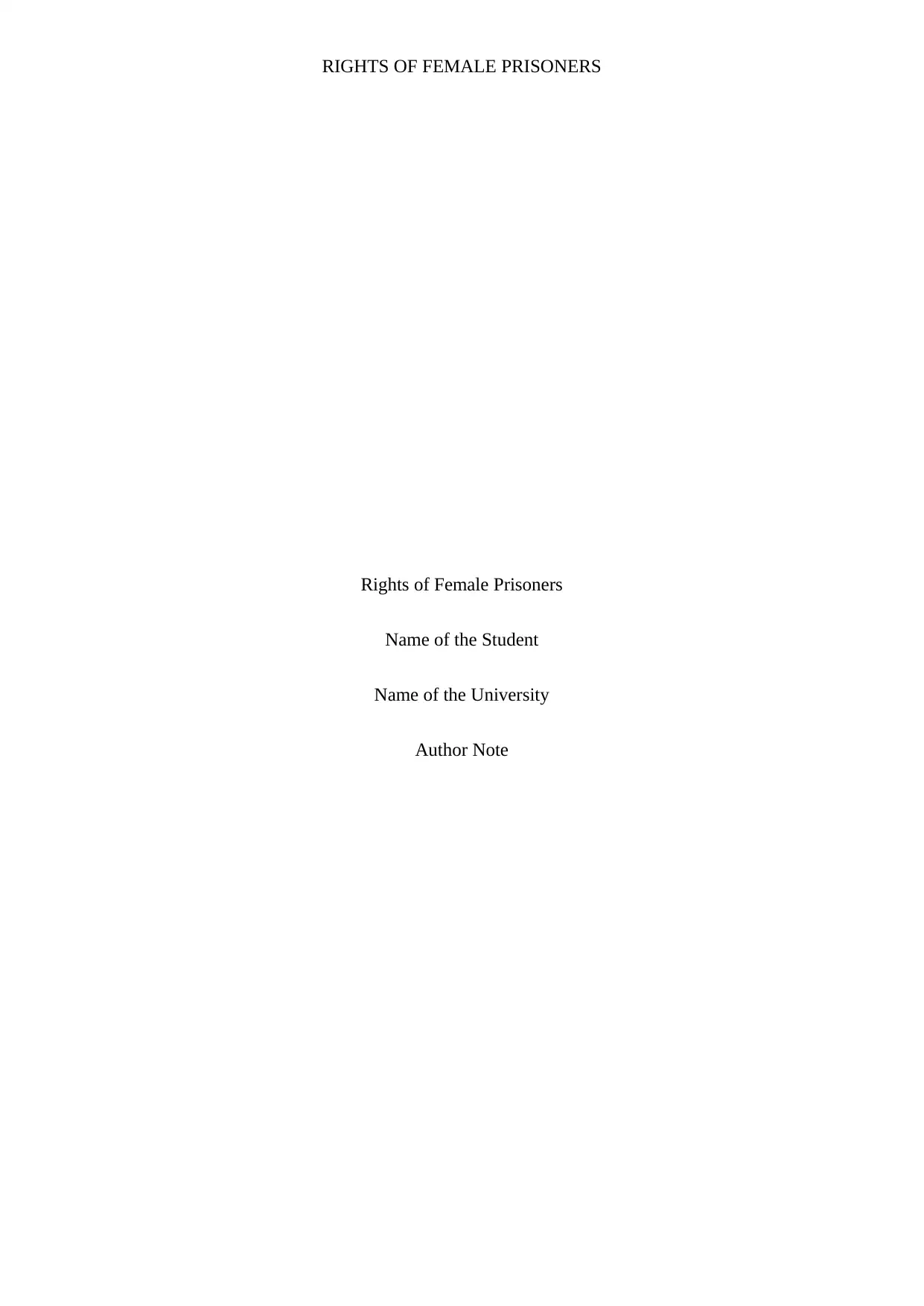
RIGHTS OF FEMALE PRISONERS
Rights of Female Prisoners
Name of the Student
Name of the University
Author Note
Rights of Female Prisoners
Name of the Student
Name of the University
Author Note
Paraphrase This Document
Need a fresh take? Get an instant paraphrase of this document with our AI Paraphraser
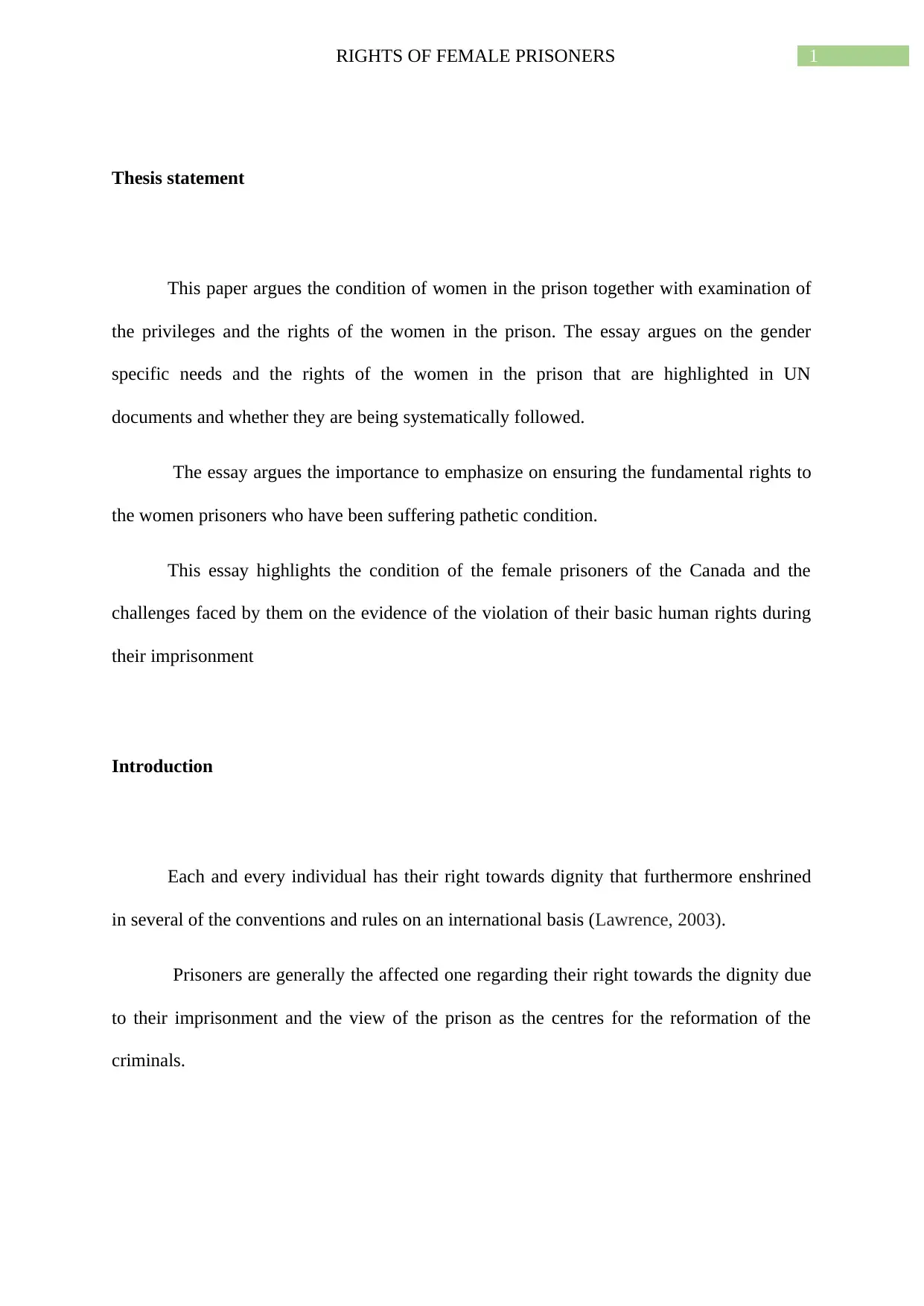
1RIGHTS OF FEMALE PRISONERS
Thesis statement
This paper argues the condition of women in the prison together with examination of
the privileges and the rights of the women in the prison. The essay argues on the gender
specific needs and the rights of the women in the prison that are highlighted in UN
documents and whether they are being systematically followed.
The essay argues the importance to emphasize on ensuring the fundamental rights to
the women prisoners who have been suffering pathetic condition.
This essay highlights the condition of the female prisoners of the Canada and the
challenges faced by them on the evidence of the violation of their basic human rights during
their imprisonment
Introduction
Each and every individual has their right towards dignity that furthermore enshrined
in several of the conventions and rules on an international basis (Lawrence, 2003).
Prisoners are generally the affected one regarding their right towards the dignity due
to their imprisonment and the view of the prison as the centres for the reformation of the
criminals.
Thesis statement
This paper argues the condition of women in the prison together with examination of
the privileges and the rights of the women in the prison. The essay argues on the gender
specific needs and the rights of the women in the prison that are highlighted in UN
documents and whether they are being systematically followed.
The essay argues the importance to emphasize on ensuring the fundamental rights to
the women prisoners who have been suffering pathetic condition.
This essay highlights the condition of the female prisoners of the Canada and the
challenges faced by them on the evidence of the violation of their basic human rights during
their imprisonment
Introduction
Each and every individual has their right towards dignity that furthermore enshrined
in several of the conventions and rules on an international basis (Lawrence, 2003).
Prisoners are generally the affected one regarding their right towards the dignity due
to their imprisonment and the view of the prison as the centres for the reformation of the
criminals.
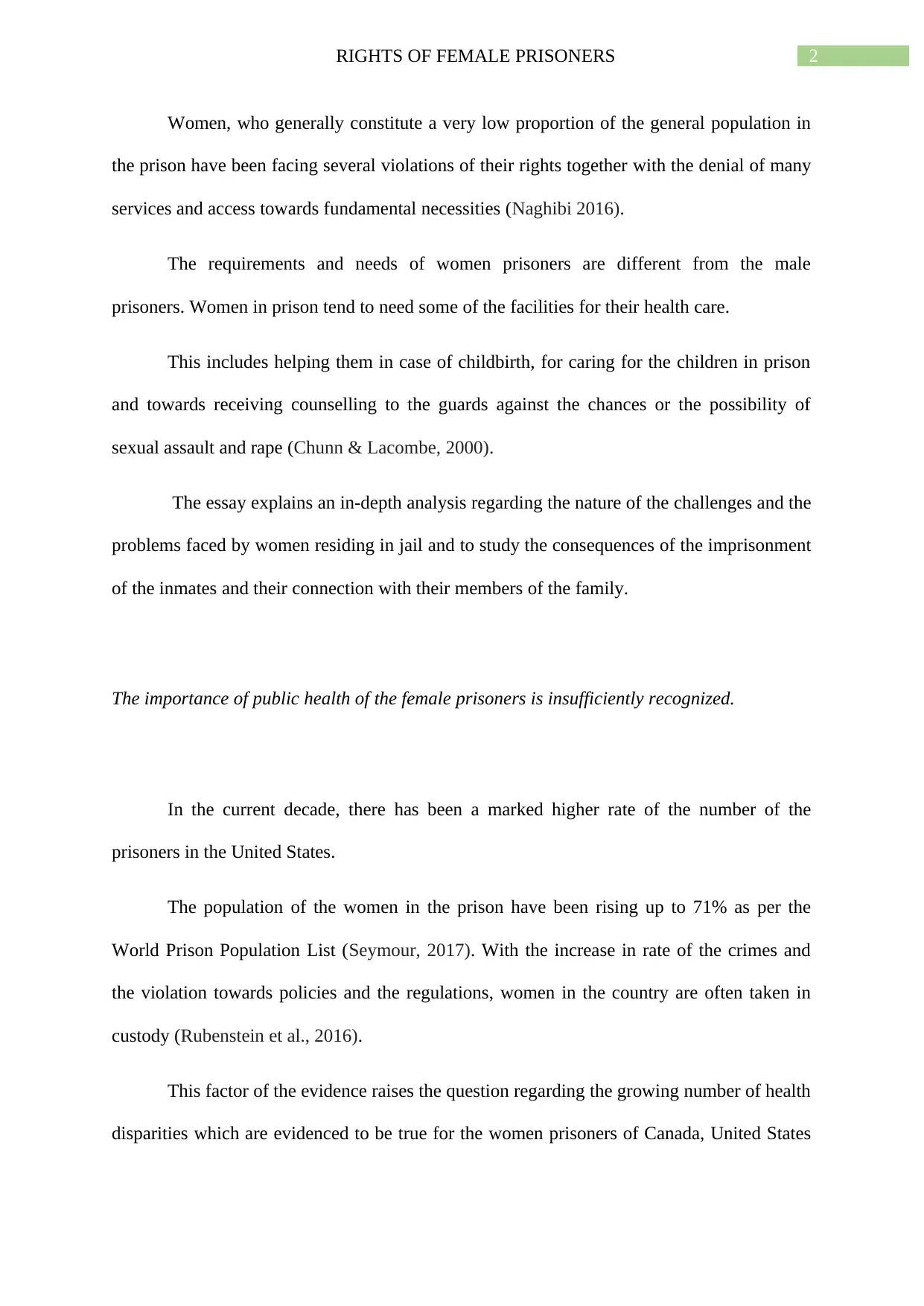
2RIGHTS OF FEMALE PRISONERS
Women, who generally constitute a very low proportion of the general population in
the prison have been facing several violations of their rights together with the denial of many
services and access towards fundamental necessities (Naghibi 2016).
The requirements and needs of women prisoners are different from the male
prisoners. Women in prison tend to need some of the facilities for their health care.
This includes helping them in case of childbirth, for caring for the children in prison
and towards receiving counselling to the guards against the chances or the possibility of
sexual assault and rape (Chunn & Lacombe, 2000).
The essay explains an in-depth analysis regarding the nature of the challenges and the
problems faced by women residing in jail and to study the consequences of the imprisonment
of the inmates and their connection with their members of the family.
The importance of public health of the female prisoners is insufficiently recognized.
In the current decade, there has been a marked higher rate of the number of the
prisoners in the United States.
The population of the women in the prison have been rising up to 71% as per the
World Prison Population List (Seymour, 2017). With the increase in rate of the crimes and
the violation towards policies and the regulations, women in the country are often taken in
custody (Rubenstein et al., 2016).
This factor of the evidence raises the question regarding the growing number of health
disparities which are evidenced to be true for the women prisoners of Canada, United States
Women, who generally constitute a very low proportion of the general population in
the prison have been facing several violations of their rights together with the denial of many
services and access towards fundamental necessities (Naghibi 2016).
The requirements and needs of women prisoners are different from the male
prisoners. Women in prison tend to need some of the facilities for their health care.
This includes helping them in case of childbirth, for caring for the children in prison
and towards receiving counselling to the guards against the chances or the possibility of
sexual assault and rape (Chunn & Lacombe, 2000).
The essay explains an in-depth analysis regarding the nature of the challenges and the
problems faced by women residing in jail and to study the consequences of the imprisonment
of the inmates and their connection with their members of the family.
The importance of public health of the female prisoners is insufficiently recognized.
In the current decade, there has been a marked higher rate of the number of the
prisoners in the United States.
The population of the women in the prison have been rising up to 71% as per the
World Prison Population List (Seymour, 2017). With the increase in rate of the crimes and
the violation towards policies and the regulations, women in the country are often taken in
custody (Rubenstein et al., 2016).
This factor of the evidence raises the question regarding the growing number of health
disparities which are evidenced to be true for the women prisoners of Canada, United States
⊘ This is a preview!⊘
Do you want full access?
Subscribe today to unlock all pages.

Trusted by 1+ million students worldwide
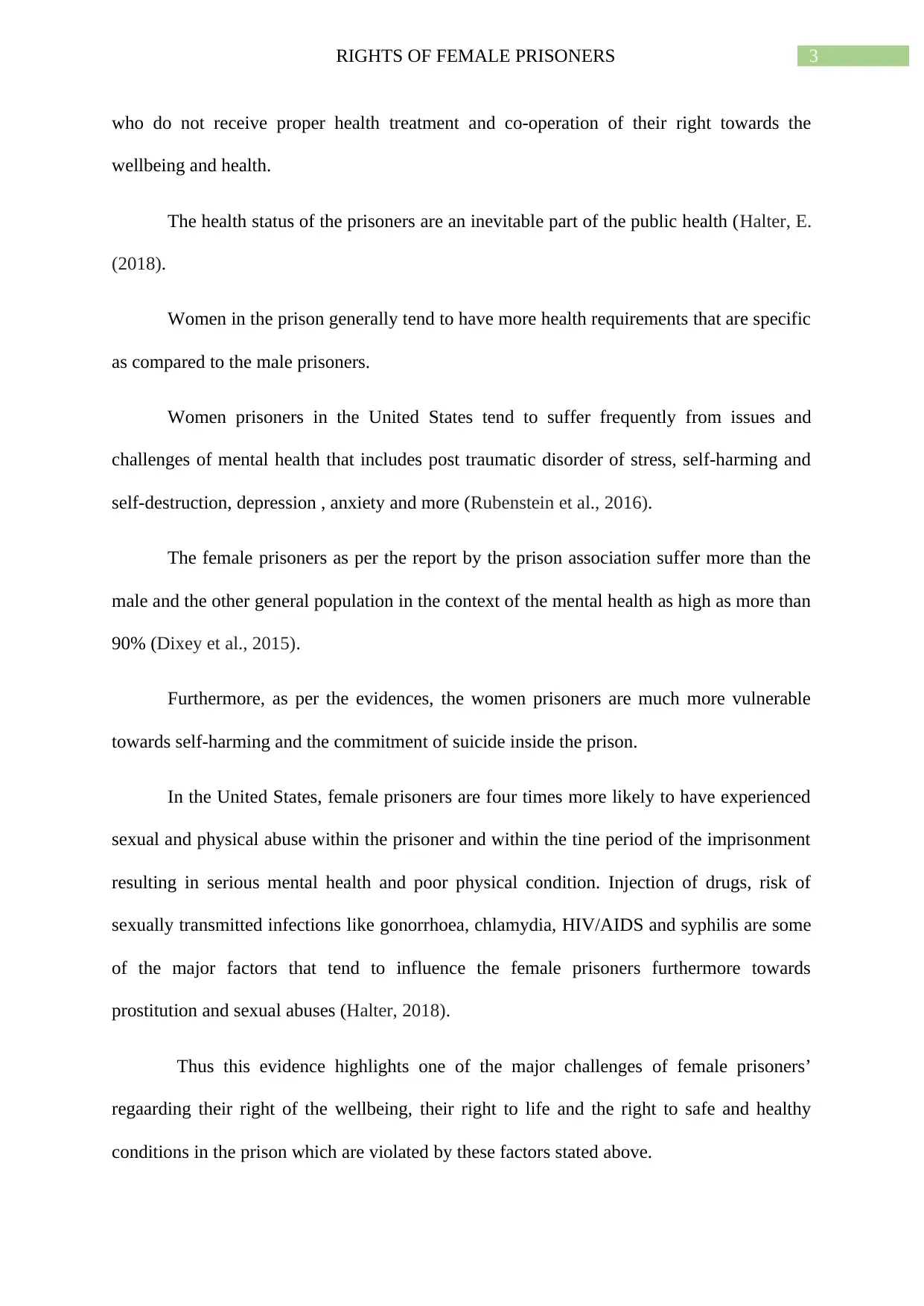
3RIGHTS OF FEMALE PRISONERS
who do not receive proper health treatment and co-operation of their right towards the
wellbeing and health.
The health status of the prisoners are an inevitable part of the public health (Halter, E.
(2018).
Women in the prison generally tend to have more health requirements that are specific
as compared to the male prisoners.
Women prisoners in the United States tend to suffer frequently from issues and
challenges of mental health that includes post traumatic disorder of stress, self-harming and
self-destruction, depression , anxiety and more (Rubenstein et al., 2016).
The female prisoners as per the report by the prison association suffer more than the
male and the other general population in the context of the mental health as high as more than
90% (Dixey et al., 2015).
Furthermore, as per the evidences, the women prisoners are much more vulnerable
towards self-harming and the commitment of suicide inside the prison.
In the United States, female prisoners are four times more likely to have experienced
sexual and physical abuse within the prisoner and within the tine period of the imprisonment
resulting in serious mental health and poor physical condition. Injection of drugs, risk of
sexually transmitted infections like gonorrhoea, chlamydia, HIV/AIDS and syphilis are some
of the major factors that tend to influence the female prisoners furthermore towards
prostitution and sexual abuses (Halter, 2018).
Thus this evidence highlights one of the major challenges of female prisoners’
regaarding their right of the wellbeing, their right to life and the right to safe and healthy
conditions in the prison which are violated by these factors stated above.
who do not receive proper health treatment and co-operation of their right towards the
wellbeing and health.
The health status of the prisoners are an inevitable part of the public health (Halter, E.
(2018).
Women in the prison generally tend to have more health requirements that are specific
as compared to the male prisoners.
Women prisoners in the United States tend to suffer frequently from issues and
challenges of mental health that includes post traumatic disorder of stress, self-harming and
self-destruction, depression , anxiety and more (Rubenstein et al., 2016).
The female prisoners as per the report by the prison association suffer more than the
male and the other general population in the context of the mental health as high as more than
90% (Dixey et al., 2015).
Furthermore, as per the evidences, the women prisoners are much more vulnerable
towards self-harming and the commitment of suicide inside the prison.
In the United States, female prisoners are four times more likely to have experienced
sexual and physical abuse within the prisoner and within the tine period of the imprisonment
resulting in serious mental health and poor physical condition. Injection of drugs, risk of
sexually transmitted infections like gonorrhoea, chlamydia, HIV/AIDS and syphilis are some
of the major factors that tend to influence the female prisoners furthermore towards
prostitution and sexual abuses (Halter, 2018).
Thus this evidence highlights one of the major challenges of female prisoners’
regaarding their right of the wellbeing, their right to life and the right to safe and healthy
conditions in the prison which are violated by these factors stated above.
Paraphrase This Document
Need a fresh take? Get an instant paraphrase of this document with our AI Paraphraser
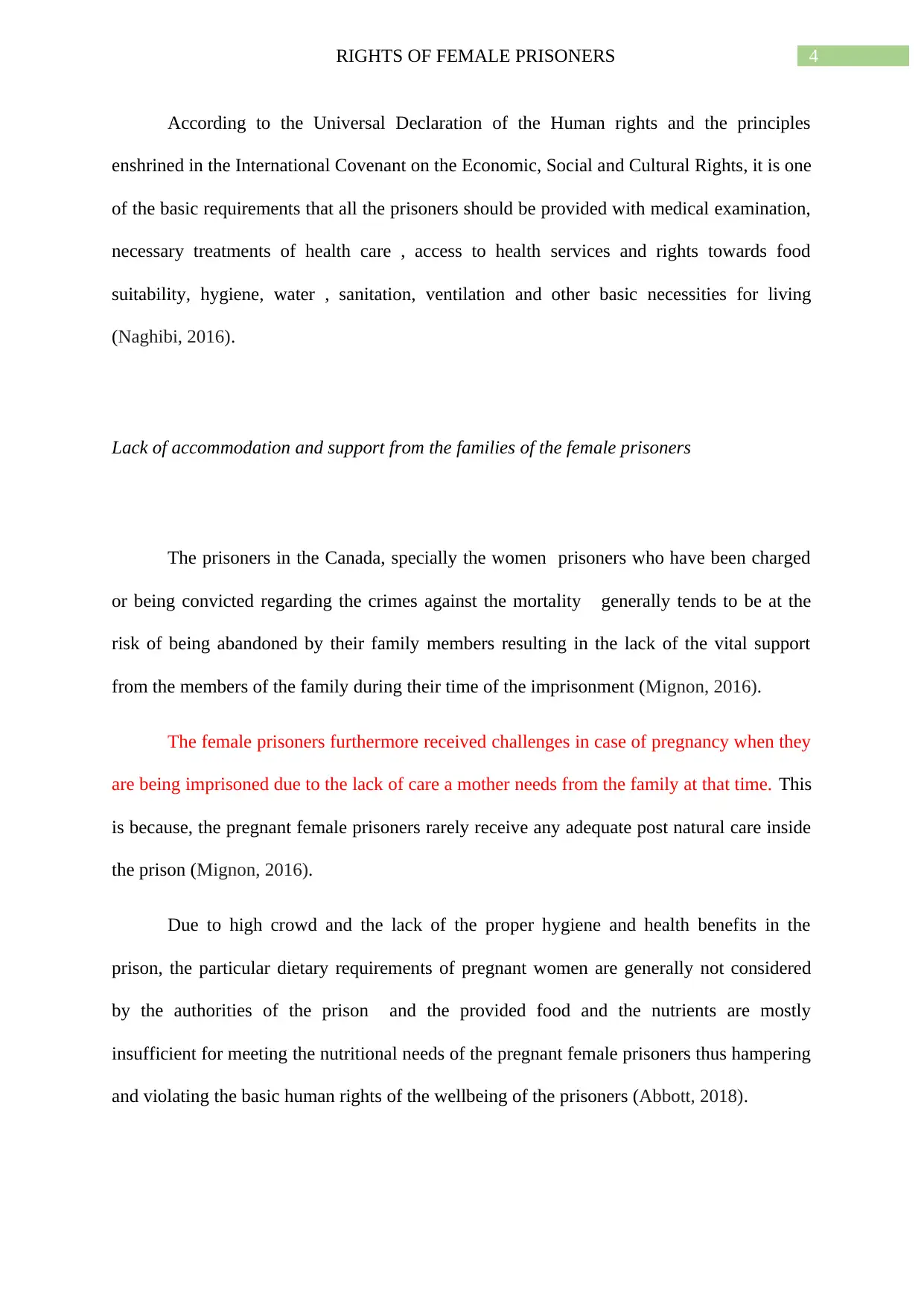
4RIGHTS OF FEMALE PRISONERS
According to the Universal Declaration of the Human rights and the principles
enshrined in the International Covenant on the Economic, Social and Cultural Rights, it is one
of the basic requirements that all the prisoners should be provided with medical examination,
necessary treatments of health care , access to health services and rights towards food
suitability, hygiene, water , sanitation, ventilation and other basic necessities for living
(Naghibi, 2016).
Lack of accommodation and support from the families of the female prisoners
The prisoners in the Canada, specially the women prisoners who have been charged
or being convicted regarding the crimes against the mortality generally tends to be at the
risk of being abandoned by their family members resulting in the lack of the vital support
from the members of the family during their time of the imprisonment (Mignon, 2016).
The female prisoners furthermore received challenges in case of pregnancy when they
are being imprisoned due to the lack of care a mother needs from the family at that time. This
is because, the pregnant female prisoners rarely receive any adequate post natural care inside
the prison (Mignon, 2016).
Due to high crowd and the lack of the proper hygiene and health benefits in the
prison, the particular dietary requirements of pregnant women are generally not considered
by the authorities of the prison and the provided food and the nutrients are mostly
insufficient for meeting the nutritional needs of the pregnant female prisoners thus hampering
and violating the basic human rights of the wellbeing of the prisoners (Abbott, 2018).
According to the Universal Declaration of the Human rights and the principles
enshrined in the International Covenant on the Economic, Social and Cultural Rights, it is one
of the basic requirements that all the prisoners should be provided with medical examination,
necessary treatments of health care , access to health services and rights towards food
suitability, hygiene, water , sanitation, ventilation and other basic necessities for living
(Naghibi, 2016).
Lack of accommodation and support from the families of the female prisoners
The prisoners in the Canada, specially the women prisoners who have been charged
or being convicted regarding the crimes against the mortality generally tends to be at the
risk of being abandoned by their family members resulting in the lack of the vital support
from the members of the family during their time of the imprisonment (Mignon, 2016).
The female prisoners furthermore received challenges in case of pregnancy when they
are being imprisoned due to the lack of care a mother needs from the family at that time. This
is because, the pregnant female prisoners rarely receive any adequate post natural care inside
the prison (Mignon, 2016).
Due to high crowd and the lack of the proper hygiene and health benefits in the
prison, the particular dietary requirements of pregnant women are generally not considered
by the authorities of the prison and the provided food and the nutrients are mostly
insufficient for meeting the nutritional needs of the pregnant female prisoners thus hampering
and violating the basic human rights of the wellbeing of the prisoners (Abbott, 2018).
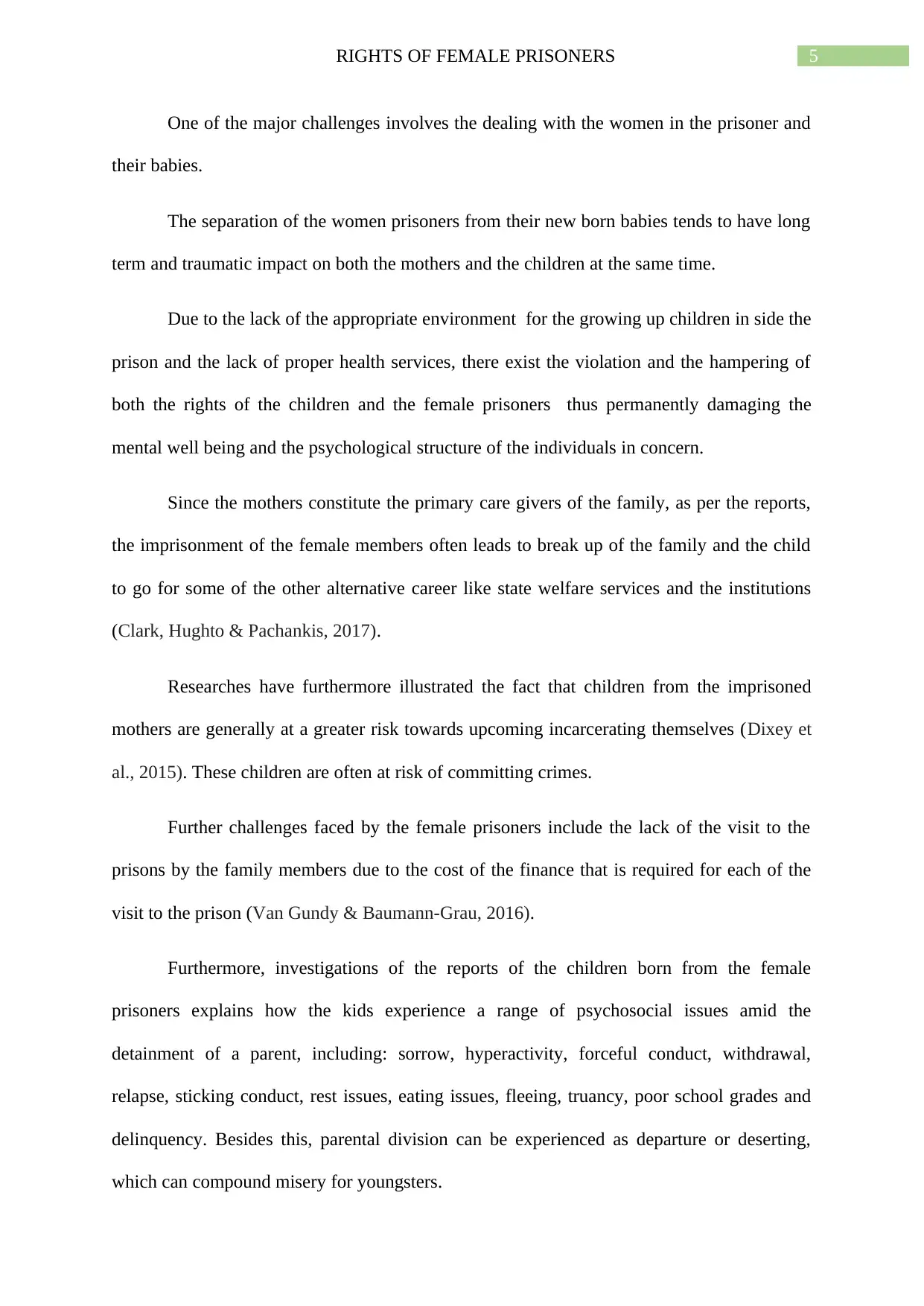
5RIGHTS OF FEMALE PRISONERS
One of the major challenges involves the dealing with the women in the prisoner and
their babies.
The separation of the women prisoners from their new born babies tends to have long
term and traumatic impact on both the mothers and the children at the same time.
Due to the lack of the appropriate environment for the growing up children in side the
prison and the lack of proper health services, there exist the violation and the hampering of
both the rights of the children and the female prisoners thus permanently damaging the
mental well being and the psychological structure of the individuals in concern.
Since the mothers constitute the primary care givers of the family, as per the reports,
the imprisonment of the female members often leads to break up of the family and the child
to go for some of the other alternative career like state welfare services and the institutions
(Clark, Hughto & Pachankis, 2017).
Researches have furthermore illustrated the fact that children from the imprisoned
mothers are generally at a greater risk towards upcoming incarcerating themselves (Dixey et
al., 2015). These children are often at risk of committing crimes.
Further challenges faced by the female prisoners include the lack of the visit to the
prisons by the family members due to the cost of the finance that is required for each of the
visit to the prison (Van Gundy & Baumann-Grau, 2016).
Furthermore, investigations of the reports of the children born from the female
prisoners explains how the kids experience a range of psychosocial issues amid the
detainment of a parent, including: sorrow, hyperactivity, forceful conduct, withdrawal,
relapse, sticking conduct, rest issues, eating issues, fleeing, truancy, poor school grades and
delinquency. Besides this, parental division can be experienced as departure or deserting,
which can compound misery for youngsters.
One of the major challenges involves the dealing with the women in the prisoner and
their babies.
The separation of the women prisoners from their new born babies tends to have long
term and traumatic impact on both the mothers and the children at the same time.
Due to the lack of the appropriate environment for the growing up children in side the
prison and the lack of proper health services, there exist the violation and the hampering of
both the rights of the children and the female prisoners thus permanently damaging the
mental well being and the psychological structure of the individuals in concern.
Since the mothers constitute the primary care givers of the family, as per the reports,
the imprisonment of the female members often leads to break up of the family and the child
to go for some of the other alternative career like state welfare services and the institutions
(Clark, Hughto & Pachankis, 2017).
Researches have furthermore illustrated the fact that children from the imprisoned
mothers are generally at a greater risk towards upcoming incarcerating themselves (Dixey et
al., 2015). These children are often at risk of committing crimes.
Further challenges faced by the female prisoners include the lack of the visit to the
prisons by the family members due to the cost of the finance that is required for each of the
visit to the prison (Van Gundy & Baumann-Grau, 2016).
Furthermore, investigations of the reports of the children born from the female
prisoners explains how the kids experience a range of psychosocial issues amid the
detainment of a parent, including: sorrow, hyperactivity, forceful conduct, withdrawal,
relapse, sticking conduct, rest issues, eating issues, fleeing, truancy, poor school grades and
delinquency. Besides this, parental division can be experienced as departure or deserting,
which can compound misery for youngsters.
⊘ This is a preview!⊘
Do you want full access?
Subscribe today to unlock all pages.

Trusted by 1+ million students worldwide
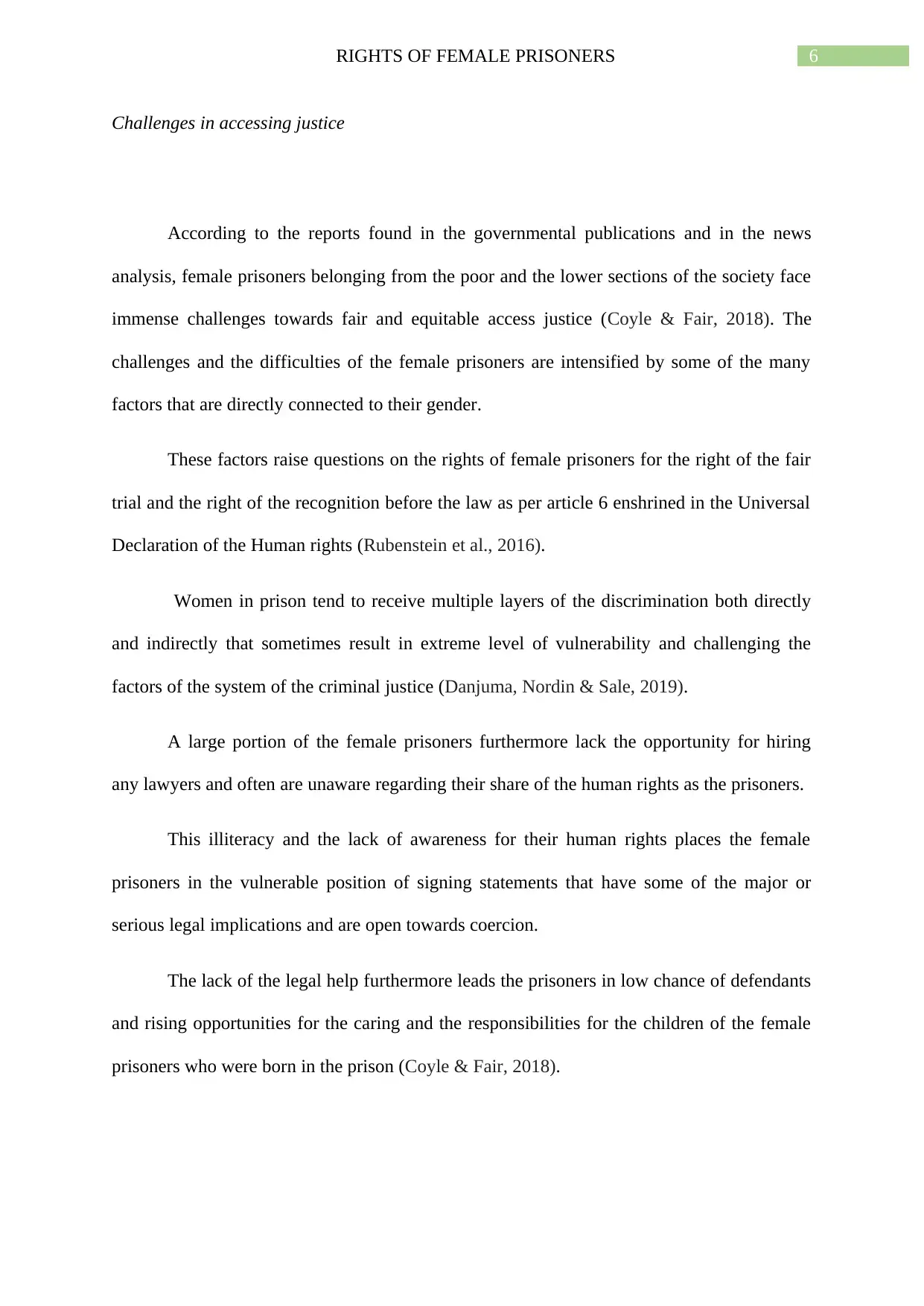
6RIGHTS OF FEMALE PRISONERS
Challenges in accessing justice
According to the reports found in the governmental publications and in the news
analysis, female prisoners belonging from the poor and the lower sections of the society face
immense challenges towards fair and equitable access justice (Coyle & Fair, 2018). The
challenges and the difficulties of the female prisoners are intensified by some of the many
factors that are directly connected to their gender.
These factors raise questions on the rights of female prisoners for the right of the fair
trial and the right of the recognition before the law as per article 6 enshrined in the Universal
Declaration of the Human rights (Rubenstein et al., 2016).
Women in prison tend to receive multiple layers of the discrimination both directly
and indirectly that sometimes result in extreme level of vulnerability and challenging the
factors of the system of the criminal justice (Danjuma, Nordin & Sale, 2019).
A large portion of the female prisoners furthermore lack the opportunity for hiring
any lawyers and often are unaware regarding their share of the human rights as the prisoners.
This illiteracy and the lack of awareness for their human rights places the female
prisoners in the vulnerable position of signing statements that have some of the major or
serious legal implications and are open towards coercion.
The lack of the legal help furthermore leads the prisoners in low chance of defendants
and rising opportunities for the caring and the responsibilities for the children of the female
prisoners who were born in the prison (Coyle & Fair, 2018).
Challenges in accessing justice
According to the reports found in the governmental publications and in the news
analysis, female prisoners belonging from the poor and the lower sections of the society face
immense challenges towards fair and equitable access justice (Coyle & Fair, 2018). The
challenges and the difficulties of the female prisoners are intensified by some of the many
factors that are directly connected to their gender.
These factors raise questions on the rights of female prisoners for the right of the fair
trial and the right of the recognition before the law as per article 6 enshrined in the Universal
Declaration of the Human rights (Rubenstein et al., 2016).
Women in prison tend to receive multiple layers of the discrimination both directly
and indirectly that sometimes result in extreme level of vulnerability and challenging the
factors of the system of the criminal justice (Danjuma, Nordin & Sale, 2019).
A large portion of the female prisoners furthermore lack the opportunity for hiring
any lawyers and often are unaware regarding their share of the human rights as the prisoners.
This illiteracy and the lack of awareness for their human rights places the female
prisoners in the vulnerable position of signing statements that have some of the major or
serious legal implications and are open towards coercion.
The lack of the legal help furthermore leads the prisoners in low chance of defendants
and rising opportunities for the caring and the responsibilities for the children of the female
prisoners who were born in the prison (Coyle & Fair, 2018).
Paraphrase This Document
Need a fresh take? Get an instant paraphrase of this document with our AI Paraphraser
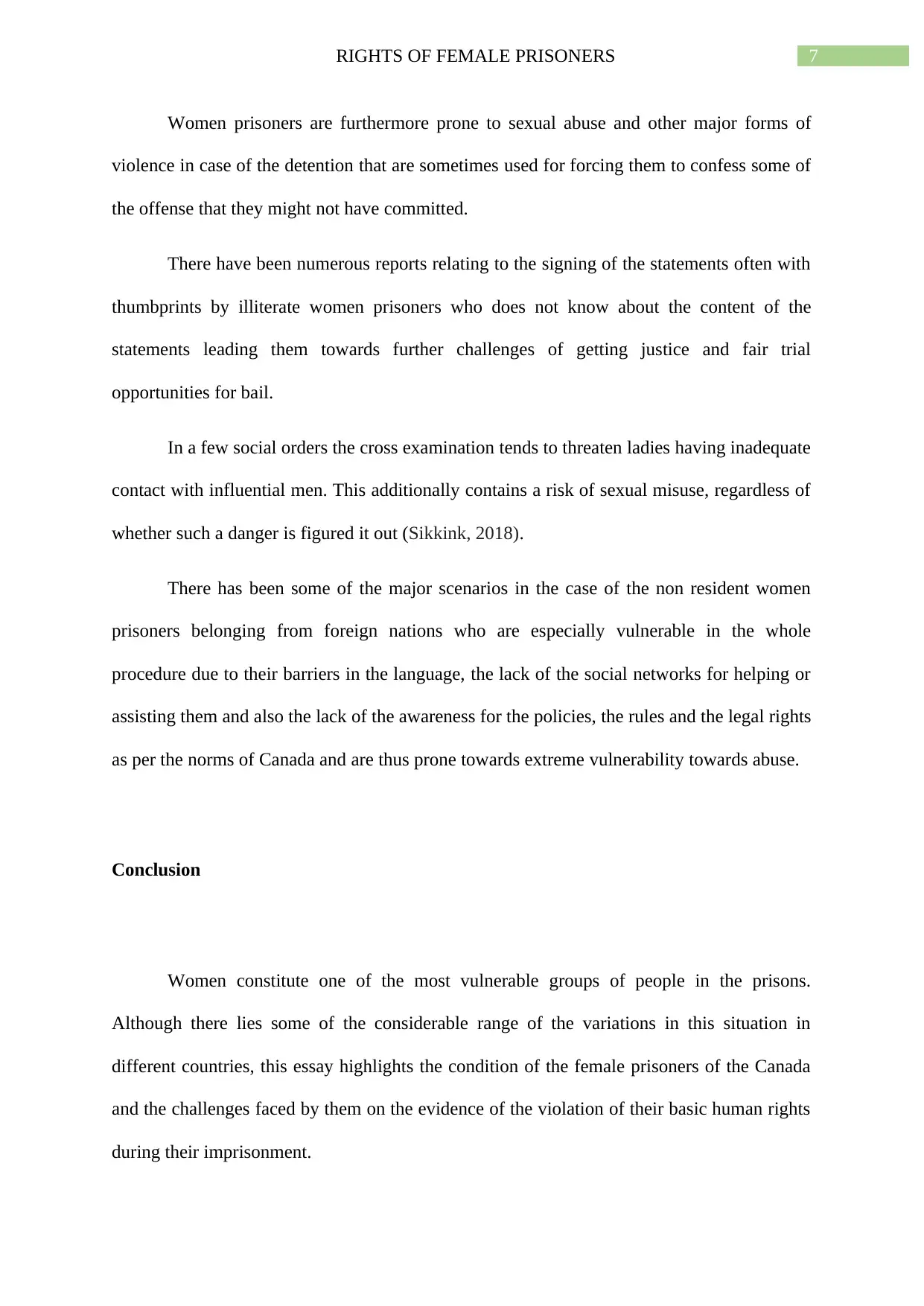
7RIGHTS OF FEMALE PRISONERS
Women prisoners are furthermore prone to sexual abuse and other major forms of
violence in case of the detention that are sometimes used for forcing them to confess some of
the offense that they might not have committed.
There have been numerous reports relating to the signing of the statements often with
thumbprints by illiterate women prisoners who does not know about the content of the
statements leading them towards further challenges of getting justice and fair trial
opportunities for bail.
In a few social orders the cross examination tends to threaten ladies having inadequate
contact with influential men. This additionally contains a risk of sexual misuse, regardless of
whether such a danger is figured it out (Sikkink, 2018).
There has been some of the major scenarios in the case of the non resident women
prisoners belonging from foreign nations who are especially vulnerable in the whole
procedure due to their barriers in the language, the lack of the social networks for helping or
assisting them and also the lack of the awareness for the policies, the rules and the legal rights
as per the norms of Canada and are thus prone towards extreme vulnerability towards abuse.
Conclusion
Women constitute one of the most vulnerable groups of people in the prisons.
Although there lies some of the considerable range of the variations in this situation in
different countries, this essay highlights the condition of the female prisoners of the Canada
and the challenges faced by them on the evidence of the violation of their basic human rights
during their imprisonment.
Women prisoners are furthermore prone to sexual abuse and other major forms of
violence in case of the detention that are sometimes used for forcing them to confess some of
the offense that they might not have committed.
There have been numerous reports relating to the signing of the statements often with
thumbprints by illiterate women prisoners who does not know about the content of the
statements leading them towards further challenges of getting justice and fair trial
opportunities for bail.
In a few social orders the cross examination tends to threaten ladies having inadequate
contact with influential men. This additionally contains a risk of sexual misuse, regardless of
whether such a danger is figured it out (Sikkink, 2018).
There has been some of the major scenarios in the case of the non resident women
prisoners belonging from foreign nations who are especially vulnerable in the whole
procedure due to their barriers in the language, the lack of the social networks for helping or
assisting them and also the lack of the awareness for the policies, the rules and the legal rights
as per the norms of Canada and are thus prone towards extreme vulnerability towards abuse.
Conclusion
Women constitute one of the most vulnerable groups of people in the prisons.
Although there lies some of the considerable range of the variations in this situation in
different countries, this essay highlights the condition of the female prisoners of the Canada
and the challenges faced by them on the evidence of the violation of their basic human rights
during their imprisonment.
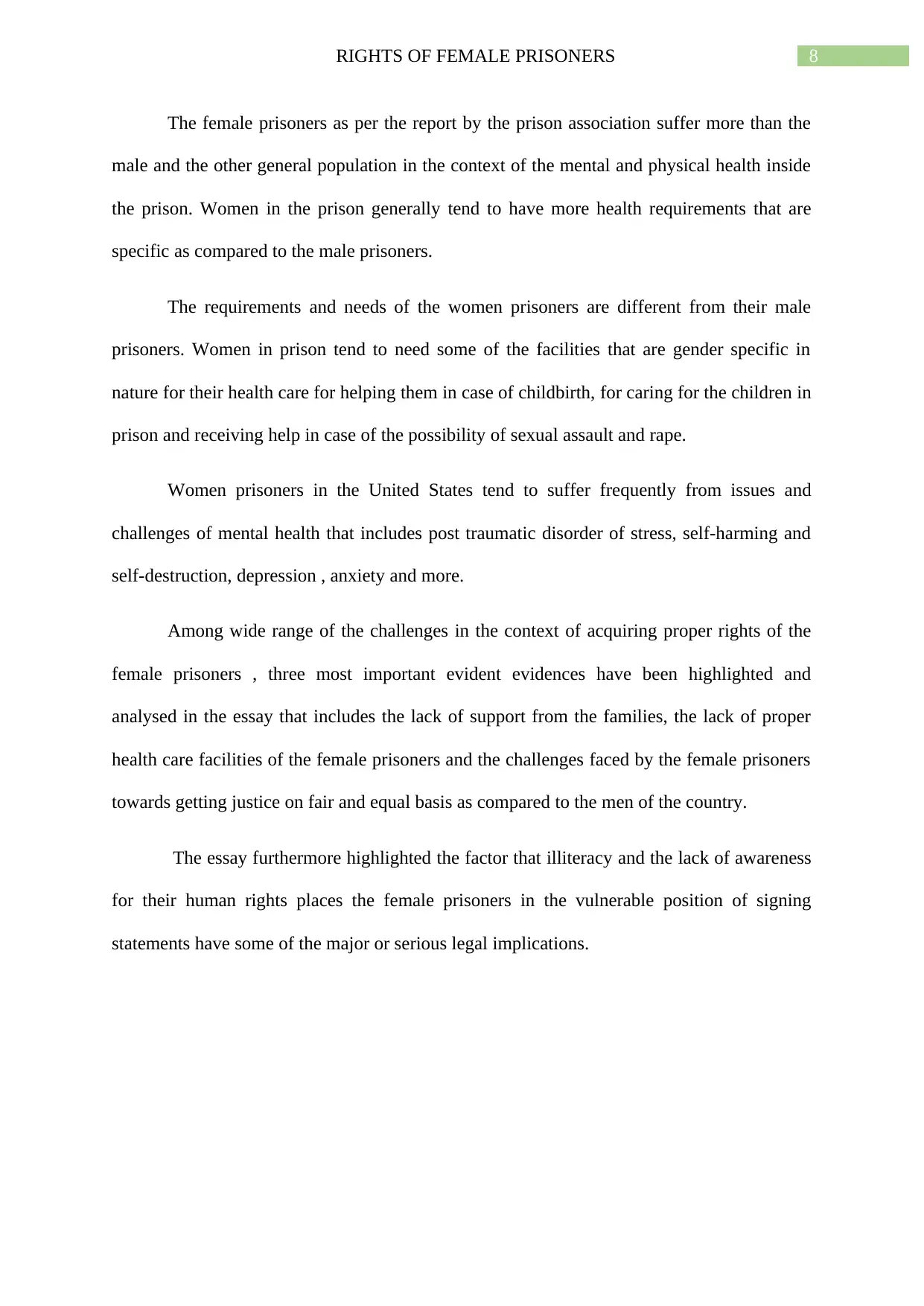
8RIGHTS OF FEMALE PRISONERS
The female prisoners as per the report by the prison association suffer more than the
male and the other general population in the context of the mental and physical health inside
the prison. Women in the prison generally tend to have more health requirements that are
specific as compared to the male prisoners.
The requirements and needs of the women prisoners are different from their male
prisoners. Women in prison tend to need some of the facilities that are gender specific in
nature for their health care for helping them in case of childbirth, for caring for the children in
prison and receiving help in case of the possibility of sexual assault and rape.
Women prisoners in the United States tend to suffer frequently from issues and
challenges of mental health that includes post traumatic disorder of stress, self-harming and
self-destruction, depression , anxiety and more.
Among wide range of the challenges in the context of acquiring proper rights of the
female prisoners , three most important evident evidences have been highlighted and
analysed in the essay that includes the lack of support from the families, the lack of proper
health care facilities of the female prisoners and the challenges faced by the female prisoners
towards getting justice on fair and equal basis as compared to the men of the country.
The essay furthermore highlighted the factor that illiteracy and the lack of awareness
for their human rights places the female prisoners in the vulnerable position of signing
statements have some of the major or serious legal implications.
The female prisoners as per the report by the prison association suffer more than the
male and the other general population in the context of the mental and physical health inside
the prison. Women in the prison generally tend to have more health requirements that are
specific as compared to the male prisoners.
The requirements and needs of the women prisoners are different from their male
prisoners. Women in prison tend to need some of the facilities that are gender specific in
nature for their health care for helping them in case of childbirth, for caring for the children in
prison and receiving help in case of the possibility of sexual assault and rape.
Women prisoners in the United States tend to suffer frequently from issues and
challenges of mental health that includes post traumatic disorder of stress, self-harming and
self-destruction, depression , anxiety and more.
Among wide range of the challenges in the context of acquiring proper rights of the
female prisoners , three most important evident evidences have been highlighted and
analysed in the essay that includes the lack of support from the families, the lack of proper
health care facilities of the female prisoners and the challenges faced by the female prisoners
towards getting justice on fair and equal basis as compared to the men of the country.
The essay furthermore highlighted the factor that illiteracy and the lack of awareness
for their human rights places the female prisoners in the vulnerable position of signing
statements have some of the major or serious legal implications.
⊘ This is a preview!⊘
Do you want full access?
Subscribe today to unlock all pages.

Trusted by 1+ million students worldwide
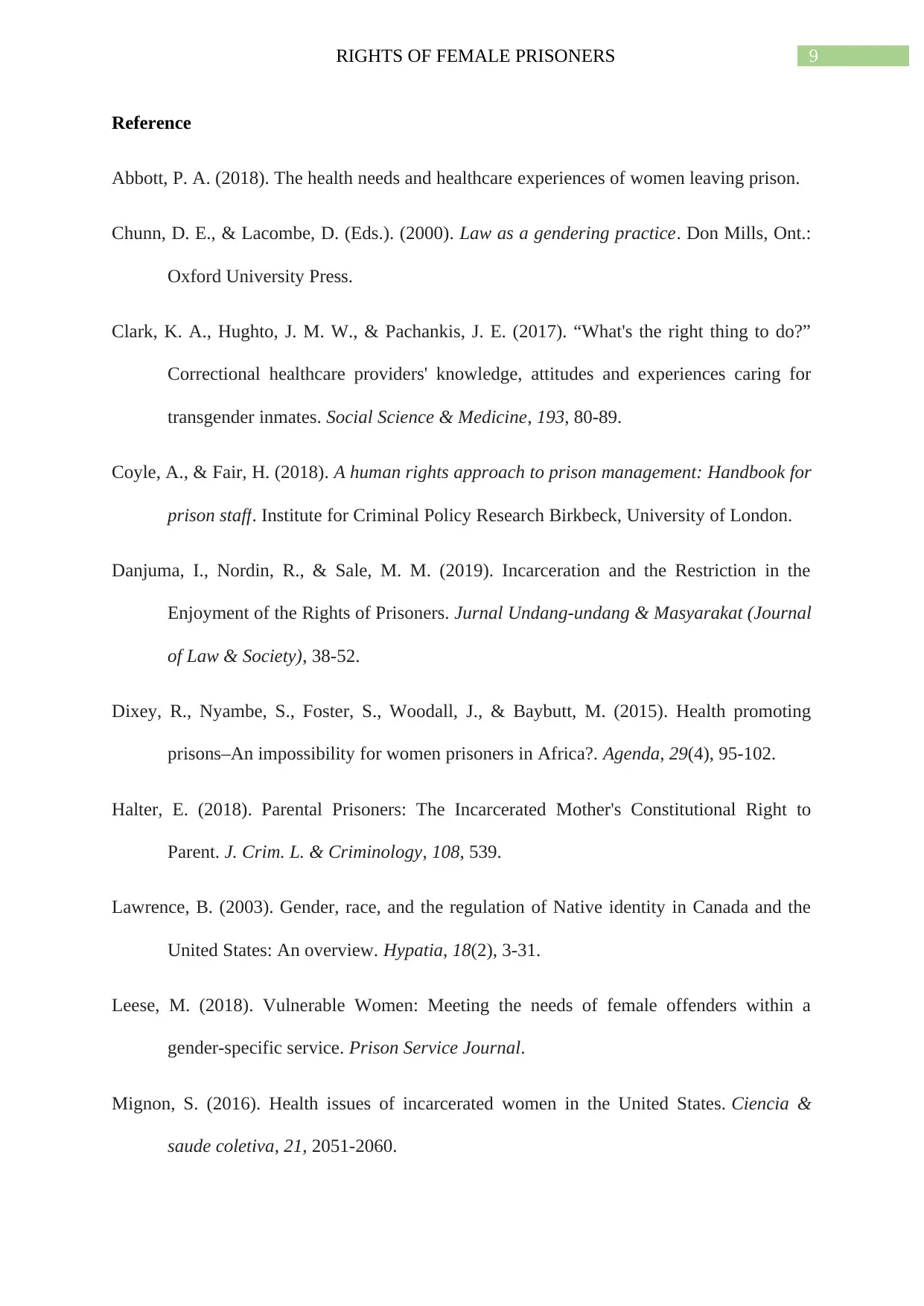
9RIGHTS OF FEMALE PRISONERS
Reference
Abbott, P. A. (2018). The health needs and healthcare experiences of women leaving prison.
Chunn, D. E., & Lacombe, D. (Eds.). (2000). Law as a gendering practice. Don Mills, Ont.:
Oxford University Press.
Clark, K. A., Hughto, J. M. W., & Pachankis, J. E. (2017). “What's the right thing to do?”
Correctional healthcare providers' knowledge, attitudes and experiences caring for
transgender inmates. Social Science & Medicine, 193, 80-89.
Coyle, A., & Fair, H. (2018). A human rights approach to prison management: Handbook for
prison staff. Institute for Criminal Policy Research Birkbeck, University of London.
Danjuma, I., Nordin, R., & Sale, M. M. (2019). Incarceration and the Restriction in the
Enjoyment of the Rights of Prisoners. Jurnal Undang-undang & Masyarakat (Journal
of Law & Society), 38-52.
Dixey, R., Nyambe, S., Foster, S., Woodall, J., & Baybutt, M. (2015). Health promoting
prisons–An impossibility for women prisoners in Africa?. Agenda, 29(4), 95-102.
Halter, E. (2018). Parental Prisoners: The Incarcerated Mother's Constitutional Right to
Parent. J. Crim. L. & Criminology, 108, 539.
Lawrence, B. (2003). Gender, race, and the regulation of Native identity in Canada and the
United States: An overview. Hypatia, 18(2), 3-31.
Leese, M. (2018). Vulnerable Women: Meeting the needs of female offenders within a
gender-specific service. Prison Service Journal.
Mignon, S. (2016). Health issues of incarcerated women in the United States. Ciencia &
saude coletiva, 21, 2051-2060.
Reference
Abbott, P. A. (2018). The health needs and healthcare experiences of women leaving prison.
Chunn, D. E., & Lacombe, D. (Eds.). (2000). Law as a gendering practice. Don Mills, Ont.:
Oxford University Press.
Clark, K. A., Hughto, J. M. W., & Pachankis, J. E. (2017). “What's the right thing to do?”
Correctional healthcare providers' knowledge, attitudes and experiences caring for
transgender inmates. Social Science & Medicine, 193, 80-89.
Coyle, A., & Fair, H. (2018). A human rights approach to prison management: Handbook for
prison staff. Institute for Criminal Policy Research Birkbeck, University of London.
Danjuma, I., Nordin, R., & Sale, M. M. (2019). Incarceration and the Restriction in the
Enjoyment of the Rights of Prisoners. Jurnal Undang-undang & Masyarakat (Journal
of Law & Society), 38-52.
Dixey, R., Nyambe, S., Foster, S., Woodall, J., & Baybutt, M. (2015). Health promoting
prisons–An impossibility for women prisoners in Africa?. Agenda, 29(4), 95-102.
Halter, E. (2018). Parental Prisoners: The Incarcerated Mother's Constitutional Right to
Parent. J. Crim. L. & Criminology, 108, 539.
Lawrence, B. (2003). Gender, race, and the regulation of Native identity in Canada and the
United States: An overview. Hypatia, 18(2), 3-31.
Leese, M. (2018). Vulnerable Women: Meeting the needs of female offenders within a
gender-specific service. Prison Service Journal.
Mignon, S. (2016). Health issues of incarcerated women in the United States. Ciencia &
saude coletiva, 21, 2051-2060.
Paraphrase This Document
Need a fresh take? Get an instant paraphrase of this document with our AI Paraphraser
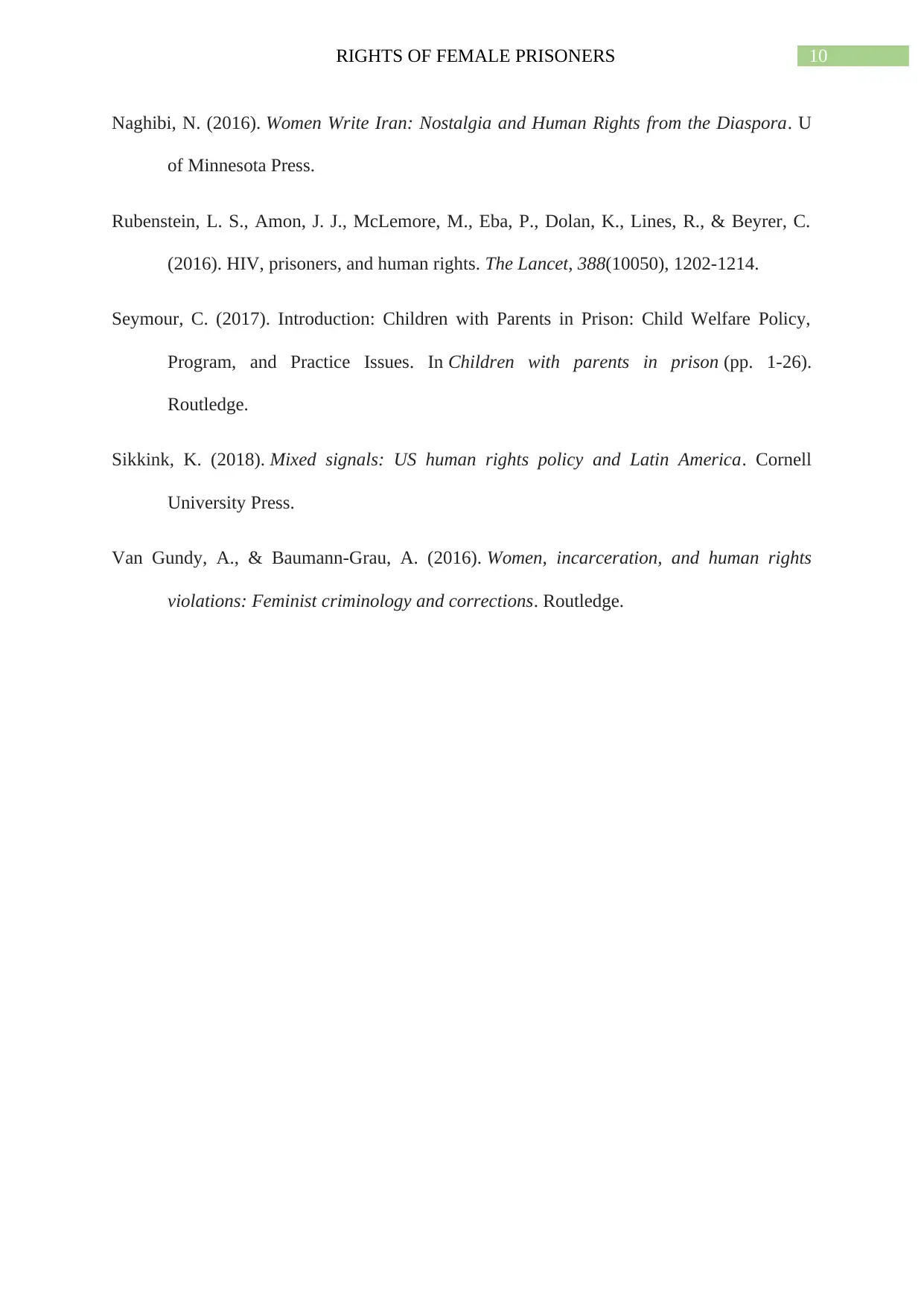
10RIGHTS OF FEMALE PRISONERS
Naghibi, N. (2016). Women Write Iran: Nostalgia and Human Rights from the Diaspora. U
of Minnesota Press.
Rubenstein, L. S., Amon, J. J., McLemore, M., Eba, P., Dolan, K., Lines, R., & Beyrer, C.
(2016). HIV, prisoners, and human rights. The Lancet, 388(10050), 1202-1214.
Seymour, C. (2017). Introduction: Children with Parents in Prison: Child Welfare Policy,
Program, and Practice Issues. In Children with parents in prison (pp. 1-26).
Routledge.
Sikkink, K. (2018). Mixed signals: US human rights policy and Latin America. Cornell
University Press.
Van Gundy, A., & Baumann-Grau, A. (2016). Women, incarceration, and human rights
violations: Feminist criminology and corrections. Routledge.
Naghibi, N. (2016). Women Write Iran: Nostalgia and Human Rights from the Diaspora. U
of Minnesota Press.
Rubenstein, L. S., Amon, J. J., McLemore, M., Eba, P., Dolan, K., Lines, R., & Beyrer, C.
(2016). HIV, prisoners, and human rights. The Lancet, 388(10050), 1202-1214.
Seymour, C. (2017). Introduction: Children with Parents in Prison: Child Welfare Policy,
Program, and Practice Issues. In Children with parents in prison (pp. 1-26).
Routledge.
Sikkink, K. (2018). Mixed signals: US human rights policy and Latin America. Cornell
University Press.
Van Gundy, A., & Baumann-Grau, A. (2016). Women, incarceration, and human rights
violations: Feminist criminology and corrections. Routledge.
1 out of 11
Related Documents
Your All-in-One AI-Powered Toolkit for Academic Success.
+13062052269
info@desklib.com
Available 24*7 on WhatsApp / Email
![[object Object]](/_next/static/media/star-bottom.7253800d.svg)
Unlock your academic potential
Copyright © 2020–2026 A2Z Services. All Rights Reserved. Developed and managed by ZUCOL.





